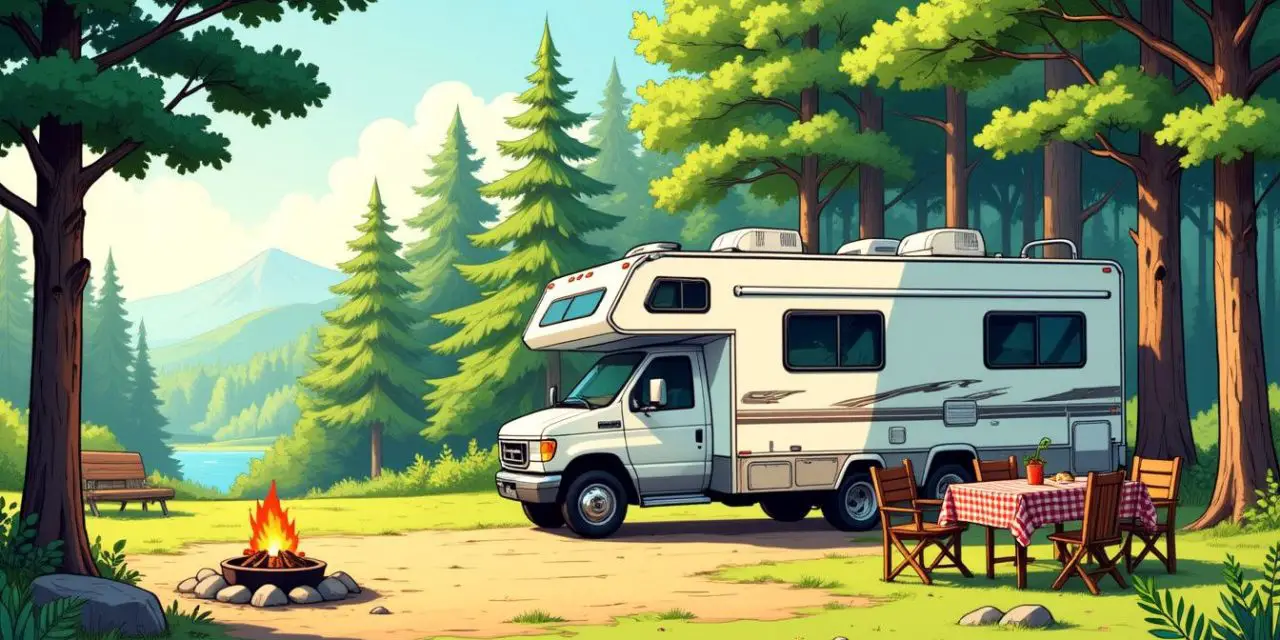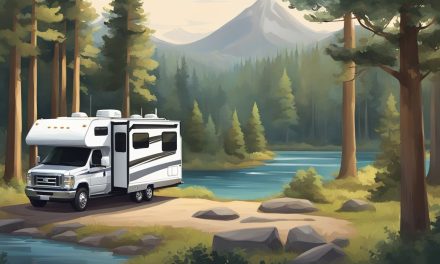Are you tired of paying high camping fees and wondering, are RV parks free? Many campers search for budget options as travel costs rise. This blog will show you real ways to save money with affordable RV camping and free campsites across the US.
Stay tuned to learn smart tips for real savings!
Are RV Parks Free?
After learning about RV camping, you might wonder about the cost. Most RV parks are not free. Private campgrounds in the U.S. charge around $38.50 per night on average. If you choose a basic campground, expect rates between $20 and $40 each night.
Staying for a week can range from $120 to $280; monthly fees often hit between $400 and $800.
Mid-range parks cost more—usually about $40 to $70 per night or up to $1,500 per month. High-end luxury resorts ask even higher prices: some may reach up to $3,500 each month with lots of extra amenities included! Parks near big cities or national parks often have much higher prices than those in remote areas.
Free options do exist for self-contained vehicles but usually come without services like water or electricity.
Free Overnight Parking Options
You have several choices for free overnight RV parking if you need a break from campground fees. Some places let you park at no cost—just keep reading to learn about these affordable options and how to make the most of them.
Walmart Parking Lots
Walmart parking lots often allow free overnight parking. This is great for RV travelers, but there are a few things to keep in mind. Store management may have rules about where you can park.
Always check with them first, to confirm that it’s okay.
Noise and lighting can be issues at Walmart lots. It might get loud or bright at night, which could disrupt your sleep. To make the best of it, follow parking etiquette: keep noise down, don’t set up outside your RV, and always leave the area clean.
Moochdocking
Moochdocking is a great way to save money on your RV travels. It means parking at the property of friends or family. You can use their hookups for free accommodations while you stay.
This option gives you a cozy spot to rest and enjoy some company.
Make sure to ask before arriving, though! Keep in mind that not everyone has space or wants visitors all the time. Being respectful helps keep those relationships strong. Plus, it’s fun to reconnect with loved ones while traveling in your RV!
Harvest Hosts and Boondockers Welcome
Moochdocking leads you to other great options for free overnight parking. Harvest Hosts offers a unique way to camp. For just $99 a year, this membership lets you stay at wineries, breweries, and golf courses across the country.
You get access to beautiful spots while enjoying local drinks and food.
Boondockers Welcome is another choice for budget-friendly stays. This service costs $79 a year and connects you with private property owners who open their land to RV travelers. Both memberships give you affordable ways to experience new places while saving money on camping fees.
Would you like to save this article?
Bureau of Land Management (BLM) Lands
Bureau of Land Management (BLM) lands offer great spots for camping. They provide public land where you can park your RV for free. This land is often in scenic or remote areas, perfect for enjoying nature.
You will find many campsites accessible by gravel roads. Some may not be well maintained, so check road conditions before heading out.
The BLM also lists free camping sites on their website. You can plan your trip better with maps from the USDA Forest Service as well. With so much open space, there are plenty of opportunities to explore wilderness and outdoor recreation without spending a dime on camping fees!
Tips for Using Free RV Parking
Research your local laws before parking. Each area has different rules, and you want to stay on the right side of them. Keep the place clean, too—pick up after yourself and leave no trace behind.
Make safety a priority; choose well-lit spots and stay aware of your surroundings.
Research Local Regulations
Know the rules before you park. Local laws can vary a lot. Each area has its own regulations for overnight parking and RV camping. Check what is allowed where you plan to stay.
Gather your supplies, too. You will need things like freshwater for your trip. Before stopping at places like Walmart, confirm with store management that it’s okay to park there overnight.
This step is key to avoiding fines or trouble later on.
Respect the Environment
Next, focus on how to respect the environment while using free RV parking. Following the “Leave No Trace” principle is key. Clean up all waste when you leave your spot. This helps keep nature beautiful and safe for everyone.
Stay aware of local hazards too. Flash floods, wildlife, and insects can pose risks. Respect campfire bans to prevent wildfires while keeping your pets leashed helps protect local animals.
Dispose of gray water at designated stations only; this keeps our waterways clean and wildlife protected. Avoid feeding any wild animals as well—it can harm them and disrupt their natural behaviors.
By practicing responsible camping, you’ll help preserve our natural habitats for future visitors to enjoy!
Prioritize Safety
Respecting the environment is important, but safety should come first. Always choose well-lit areas for overnight parking. Look for spots with nearby traffic or people around. This adds a layer of security to your stay.
Trust your instincts about safety; if something feels off, relocate right away. Keep an NOAA weather radio handy to track emergencies and check the weather forecast daily. You should also have a paper map as backup for GPS, just in case.
Being aware and prepared can make all the difference on your trip!
Conclusion
Free RV parks are available. You just need to know where to search. From Walmart lots to public lands, options exist for budget-friendly camping. Keep in mind to follow local rules and maintain the cleanliness of the locations.
Embrace the joy of nature, and enjoy your travels!







